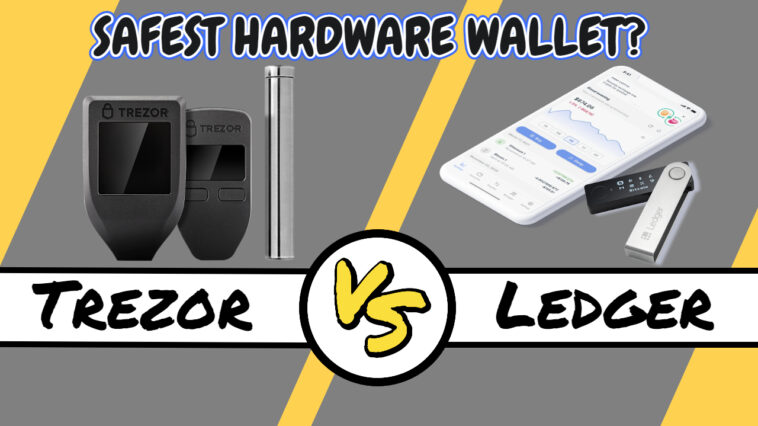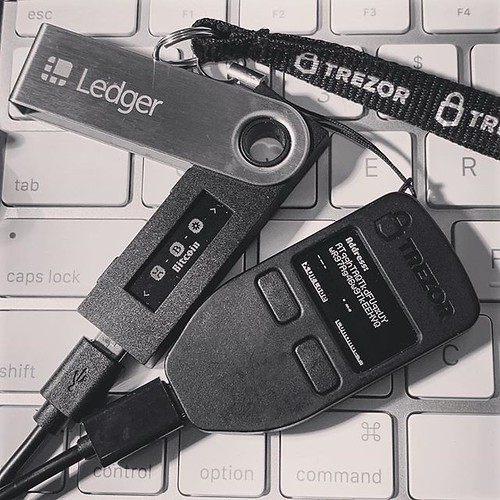Whether you are new to cryptocurrencies or a seasoned veteran, you may have heard a little about “hardware wallets”, also commonly referred to as “cold storage”. Hardware wallets like Trezor and Ledger create and store your private keys on a physical device and are kept offline to prevent any potential security threats that arise from being connected to the internet. Picture a scenario where your computer, or even your entire network is compromised by a hacker, by having your wallet on a separate physical piece of hardware the hacker’s attempts are foiled by not being able to reach your offline wallet.
Even if another person gains access to your cold wallet device they would still be required to enter a pin number that only you would know. These attributes listed above are why many people believe hardware wallets are one of the safest ways to store your private keys (and thus your cryptocurrency holdings).
If you do decide to go the hardware wallet route, you will want to select a trusted device and have it delivered directly from the manufacturer (this means no Amazon!). That being said, right now there are two pillars of the hardware wallet industry and they are the Trezor and the Ledger wallets. And while these two devices are similar, there are some subtle differences we will explore below to help you chose the safest device for your crypto storage.
#1 Ledger Vs Trezor: Pros and Cons
At the end of the day, both devices are true hardware wallets, which allow users to store their private keys (the most critical piece of information used to authorize blockchain transactions) - both providing isolation between those private keys and your much-more-vulnerable PC, tablet or smart phone.
Pricing:
Both devices are fairly comparable in price, with the Ledger slightly eeking out a lower price than the Trezor. Both entry level models of these devices will run you about 60 bucks and the advanced models cap out at around $160.
Security:
Both being hardware wallets, by design they are equally as safe and nearly impossible to hack assuming you buy them directly from the manufacturer - we cannot stress this enough, as tempting as it may be to purchase one from Amazon or EBAY, be sure to only purchase from the manufacturer websites.
Supported Coins:
Both wallets support a wide variety of coins, but Ledger has the ability to support more altcoins by volume. That being said, Trezor has support for coins like Ripple and Monero, which currently the Ledger does not. You will want to research the supported assets page of each manufacturer's website, as this list is ever-changing and this article may be out of date.
(Image courtesy of the CC BY-SA 2.0 Creative Commons license - no modifications have been made - click the image to view the original author's page).
#2 Was the Ledger Crypto Wallet Hacked?
You may have seen some news stories talking about the "hack" of the Ledger wallet - so what really went down?
Although those titles are kind of misleading, there was a hack, just not of the wallet directly; in July 2020 the customer data of the Ledger company was breached and over one million victims had their names, phone numbers, addresses and email addresses exposed.
Using this exposed information, nefarious actors attempted to use social engineering to try and gain access to Ledger customer's cryptocurrencies. The hackers sent emails and letters explaining that the customer's device had been exposed and to follow these steps to secure their coins... (the instructions then lead to the customers to lose their coins in various "creative" ways"). Additionally, some hackers took it a step further and sent sealed, packages of replacement Ledgers to customers explaining that they were receiving a new device free of charge, as their old device was vulnerable. This new device was preloaded with a backdoor that provided the hackers everything they needed to steal any coins transferred to the "new" device.
If Ledger can't even secure their customer information, should I trust them?
That's really up to you. Technically, Ledger did not directly expose anyone's coins to these hackers and the devices themselves were all safe. That being said, this situation does not bode well for a company that specializes in securing your precious assets.
The company has moved forward from the scandal and sales appear to being ramping back up, but it is important to be knowledgeable of this incident when making your decision.
#3 Which Hardware Wallet is Safest? Final Thoughts.
As you have learned, both the Ledger and Trezor devices are similar, big players in the crypto security space. Since they both are equally as secure (customer data aside) and the prices are competitive with each other, your choice is going to come down to the coins they support, the look and feel, and how comfortable you believe you will be after reading each device's documentation.
The choice is yours, but your next step should be to visit both manufacturer's websites and read about what coins they support and do a once over of their support documentations.
You can visit the official Trezor page here:
Click here <-- affiliate link embedded (we appreciate the support!)
Click here <-- no affiliate link
You can visit the official Ledger page here:
Click here <-- affiliate link embedded (we appreciate the support!)
Click here <-- no affiliate link










